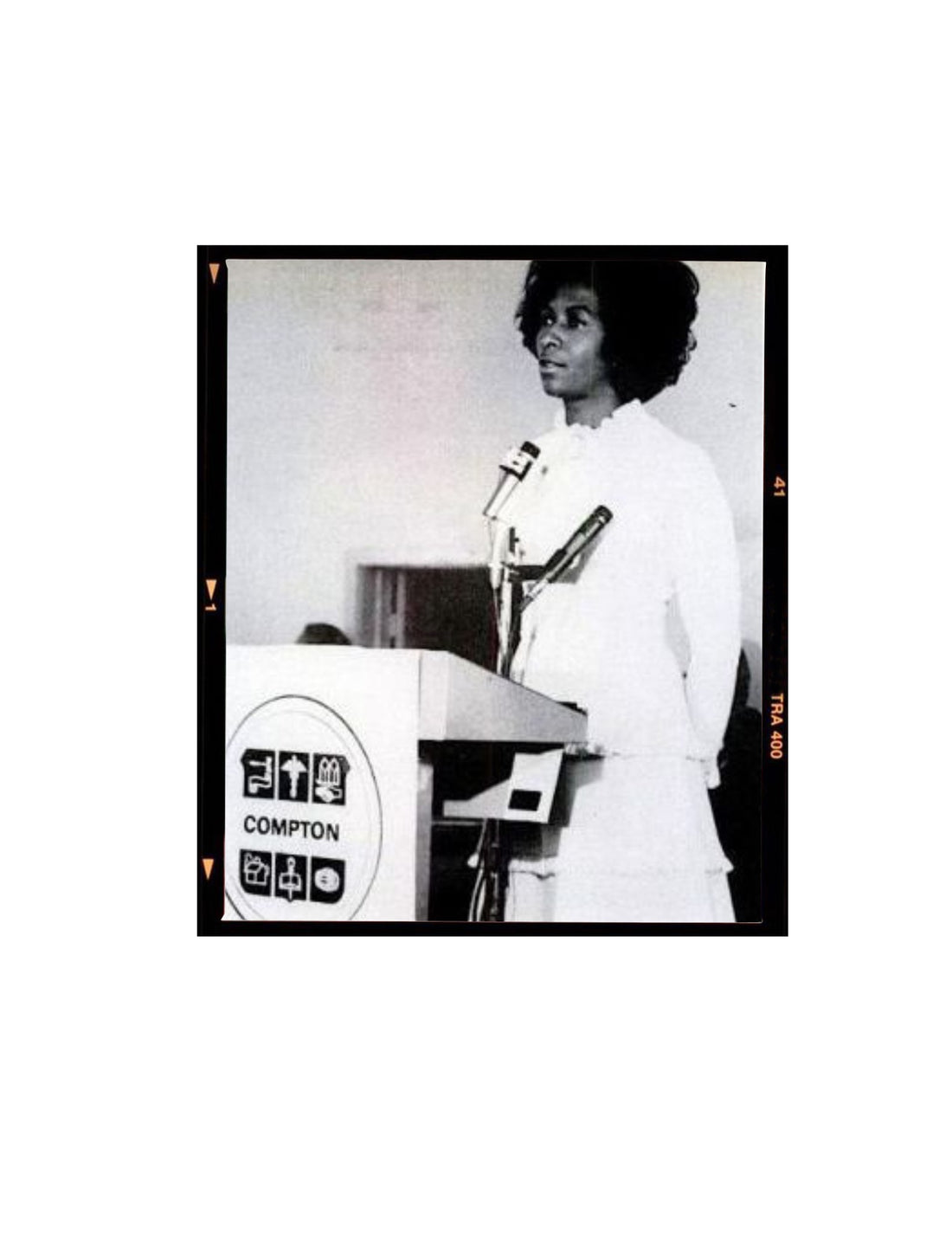Being the first is not always easy, but it is necessary. As a trailblazer, Doris Davis became the first woman to hold the positions of City Clerk and Mayor in the City of Compton. She was a black woman trying to make a difference in a white and male dominated governing body, in a time in America where being African American and a woman were often not respected. Mrs. Davis's journey is one of hope and inspiration, leaving a lasting impact on the world. She stands as a symbol of strength, a catalyst for change, an overcomer of seemingly insurmountable barriers, and achieves a historical feat: becoming the first Black woman to serve as mayor in a major U.S. city, Compton, California, on June 5th, 1973.
Davis was born an only child in 1935 in Waukegan, Illinois. Her educational journey was impressive, and her thirst and drive for knowledge were integral to her character. She graduated from Wendell Phillips High School in Chicago and pursued a Bachelor's degree at Chicago Teachers College. She then earned a Master's degree in educational administration from Northwestern University, followed by a prestigious doctorate from the University of Chicago.
By 1959, Davis moved to California to work as a teacher in the Los Angeles City School District LAUSD). Six years later, she would find herself competing for the City of Compton’s City Clerk position. This is an incredibly important position in any municipality. The City Clerk is the official recorded keeper for all business that happens in a governing body. Mrs. Davis won her election, and served three terms. The first term was under a white mayor, and the last two terms as City Clerk were served under the first Black Mayor of Compton. Dougladd Dollarhide. In 1973, Mrs. Davis was elected by the people of Compton to serve as Mayor. She beat out 8 other candidates including the incumbent, Dollarhide. While this victory was monumental for the Black community, Davis encountered unique challenges that no previous Compton mayor had faced: racism, sexism, and a rapidly changing demographic.
As the City Clerk, Doris Davis lived through the Civil Rights Acts of 1964 and 1968, and the Voting Rights Act of 1965. America was changing, but the minds and hearts of the people that governed cities, including Compton, were slower to adapt. Doris Davis overcame the odds of achieving the City Clerk and later the Mayoral positions in a racist and sexist America. With humor and grace, she navigated and flourished in a white male dominated governing body. A political opponent even told her that "a woman's place is at home, in the house." Despite experiencing microaggressions, misogyny, and numerous obstacles, she persevered focusing on her mission to uplift Compton during its white flight, increasing crime rates, and decreasing employment opportunities.
Doris Davis entered City politics during a time when Compton was a predominately white city. However, by 1970, Compton's population had shifted, the population exponentially growing to 70% African American. As a well documented byproduct of white flight, when white people left the City, so did jobs, businesses, and government investment in infrastructure and housing. Recognizing these challenges, Davis saw an opportunity to provide resources by lobbying and attracting new employers to create job opportunities for residents. She also took proactive measures to address the surge in crime rates by advocating for increased police presence and initiating an annexation program to boost tax revenue. After a strenuous four-year journey to reshape Compton's future, Davis made the decision not to seek a second term as mayor.
Beyond her political pursuits, Doris Davis dedicated her time and efforts to over two dozen organizations, including the NAACP, Urban League, and the League of Women Voters. She also founded the Daisy Child Development Centers, a non-profit organization that empowers unwed teenage mothers by offering them employment opportunities, housing, and childcare.
Today, Davis remains an integral part of the Compton community she tirelessly served. Her legacy of resilience, compassion, and unwavering dedication continues to inspire generations to come. Doris Davis's story is a testament to the power of determination, perseverance, faith, and the profound impact a single individual can make. She reminds us that our actions can ignite change and transform lives even in the face of adversity.
—
Sources:
Blackpast.org
Blackthen.com
lasentinel.net

